实验任务1
#include <stdio.h> #define N 4 int main() { int x[N] = {1, 9, 8, 4}; int i; int *p; for (i = 0; i < N; ++i) printf("%d", x[i]); printf("\n"); for (p = x; p < x + N; ++p) printf("%d", *p); printf("\n"); p = x; for (i = 0; i < N; ++i) printf("%d", *(p + i)); printf("\n"); p = x; for (i = 0; i < N; ++i) printf("%d", p[i]); printf("\n"); system("pause"); return 0; }
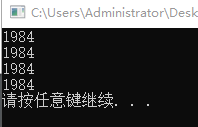
#include <stdio.h> int main() { int x[2][4] = {{1, 9, 8, 4}, {2, 0, 4, 9}}; int i, j; int *p; int(*q)[4]; for (i = 0; i < 2; ++i) { for (j = 0; j < 4; ++j) printf("%d", x[i][j]); printf("\n"); } for (p = &x[0][0], i = 0; p < &x[0][0] + 8; ++p, ++i) { printf("%d", *p); if ((i + 1) % 4 == 0) printf("\n"); } { for (j = 0; j < 4; ++j) printf("%d", *(*q + j)); printf("\n"); } system("pause"); return 0; }
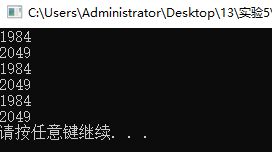
实验任务2
#include <stdio.h> #include <string.h> #define N 80 int main() { char s1[] = "Learning makes me happy"; char s2[] = "Learning makes me sleepy"; char tmp[N]; printf("sizeof(s1) vs. strlen(s1): \n"); printf("sizeof(s1) = %d\n", sizeof(s1)); printf("strlen(s1) = %d\n", strlen(s1)); printf("\nbefore swap: \n"); printf("s1: %s\n", s1); printf("s2: %s\n", s2); printf("\nswapping...\n"); strcpy(tmp, s1); strcpy(s1, s2); strcpy(s2, tmp); printf("\nafter swap: \n"); printf("s1: %s\n", s1); printf("s2: %s\n", s2); return 0; }
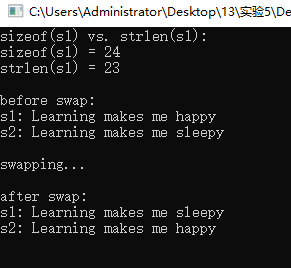
#include <stdio.h> #include <string.h> #define N 80 int main() { char *s1= "Learning makes me happy"; char *s2 = "Learning makes me sleepy"; char *tmp; printf("sizeof(s1) vs. strlen(s1): \n"); printf("sizeof(s1) = %d\n", sizeof(s1)); printf("strlen(s1) = %d\n", strlen(s1)); printf("\nbefore swap: \n"); printf("s1: %s\n", s1); printf("s2: %s\n", s2); printf("\nswapping...\n"); tmp = s1; s1 = s2; s2 = tmp; printf("\nafter swap: \n"); printf("s1: %s\n", s1); printf("s2: %s\n", s2); system("pause"); return 0; }

问题:
task2_1
1.s1的大小是 24 ,sizeof 计算的包括'0',strlen计算的是长度。
2.不能。因为没有确定大小。字符串赋值只能一位一位赋。
3.交换了。
task2_2
1.指针s1存放的是首地址,sizeof计算的一个指针的大小,strlen计算的是长度。
2.能。
3.交换的是指针,内容没有交换。
实验任务3
#include <stdio.h> void str_cpy(char *target, const char *source); void str_cat(char *str1, char *str2); int main() { char s1[80], s2[20] = "1984"; str_cpy(s1, s2); puts(s1); str_cat(s1, " Animal Farm"); puts(s1); system("pause"); return 0; } void str_cpy(char *target, const char *source) { while (*target++ = *source++); } void str_cat(char *str1, char *str2) { while (*str1) str1++; while (*str1++ = *str2++); }

实验任务4
#include <stdio.h> #define N 80 int func(char *); int main() { char str[80]; while (gets(str) != NULL) { if (func(str)) printf("yes\n"); else printf("no\n"); } return 0; } int func(char *str) { char *begin, *end; begin = end = str; while (*end) end++; end--; while (begin < end) { if (*begin != *end) return 0; else { begin++; end--; } } return 1; }
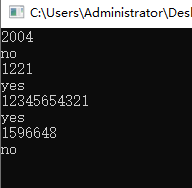
实验任务5
#include <stdio.h> #define N 80 void func(char *); int main() { char s[N]; while (scanf("%s", s) != EOF) { func(s); puts(s); } return 0; } void func(char *str) { int i; char *p1, *p2, *p; p1 = str; while (*p1 == '*') p1++; p2 = str; while (*p2) p2++; p2--; while (*p2 == '*') p2--; p = str; i = 0; while (p < p1) { str[i] = *p; p++; i++; } while (p <= p2) { if (*p != '*') { str[i] = *p; i++; } p++; } while (*p != '\0') { str[i] = *p; p++; i++; } str[i] = '\0'; }

实验任务6
#include <stdio.h> #include <string.h> void sort(char *name[], int n); int main() { char *course[4] = {"C Program", "C++ Object Oriented Program", "Operating System", "Data Structure and Algorithms"}; int i; sort(course, 4); for (i = 0; i < 4; i++) printf("%s\n", course[i]); system("pause"); return 0; } void sort(char *name[], int n) { int i, j; char *tmp; for (i = 0; i < n - 1; ++i) for (j = 0; j < n - 1 - i; ++j) if (strcmp(name[j], name[j + 1]) > 0) { tmp = name[j]; name[j] = name[j + 1]; name[j + 1] = tmp; } }
#include <stdio.h> #include <string.h> void sort(char *name[], int n); int main() { char *course[4] = {"C Program", "C++ Object Oriented Program", "Operating System", "Data Structure and Algorithms"}; int i; sort(course, 4); for (i = 0; i < 4; i++) printf("%s\n", course[i]); system("pause"); return 0; } void sort(char *name[], int n) { int i, j, k; char *tmp; for (i = 0; i < n - 1; i++) { k = i; for (j = i + 1; j < n; j++) if (strcmp(name[j], name[k]) < 0) k = j; if (k != i) { tmp = name[i]; name[i] = name[k]; name[k] = tmp; } } }

交换的是字符串的储存位置。
实验任务7
#include<stdio.h> #include <string.h> #define N 5 int check_id(char *str); // 函数声明 int main() { char *pid[N] = {"31010120000721656X", "330106199609203301", "53010220051126571", "510104199211197977", "53010220051126133Y"}; int i; for (i = 0; i < N; ++i) if (check_id(pid[i])) // 函数调用 printf("%s\tTrue\n", pid[i]); else printf("%s\tFalse\n", pid[i]); system("pause"); return 0; } // 函数定义 // 功能: 检查指针str指向的身份证号码串形式上是否合法。 // 形式合法,返回1,否则,返回0 int check_id(char *str) { int j; char x; if( strlen(str) != 18) return 0; else { for(j=0;j<18;j++) { x = *(str+j); if((x >= '0'&& x<='9')|| x == 'X') continue; else return 0; }; } }
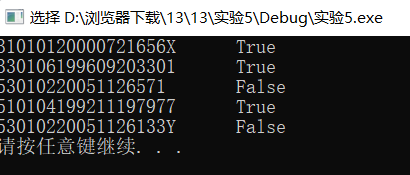
实验任务8
#include <stdio.h> #include <string.h> #define N 80 void encoder(char *s); void decoder(char *s); int main() { char words[N]; printf("输入英文文本:"); gets(words); printf("编码后的英文文本:"); encoder(words); printf("%s\n", words); printf("对编码后的英文文本解码:"); decoder(words); system("pause"); printf("%s\n", words); return 0; } void encoder(char *s) { int i, len; len = strlen(s); for(i = 0;i < len; i++) { char x; x = *(s + i); if((x >= 'a' && x <= 'z') || (x >= 'A' && x <= 'Z')) { if(x == 'z') *(s + i) = 'a'; else if(x == 'Z') *(s + i) = 'A'; else *(s + i) = x + 1; } } } void decoder(char *s) { int i, len; len = strlen(s); for(i = 0;i < len; i++) { char x; x = *(s + i); if((x >= 'a' && x <= 'z') || (x >= 'A' && x <= 'Z')) { if(x == 'a') *(s + i) = 'z'; else if(x == 'A') *(s + i) = 'Z'; else *(s + i) = x - 1; } } }





